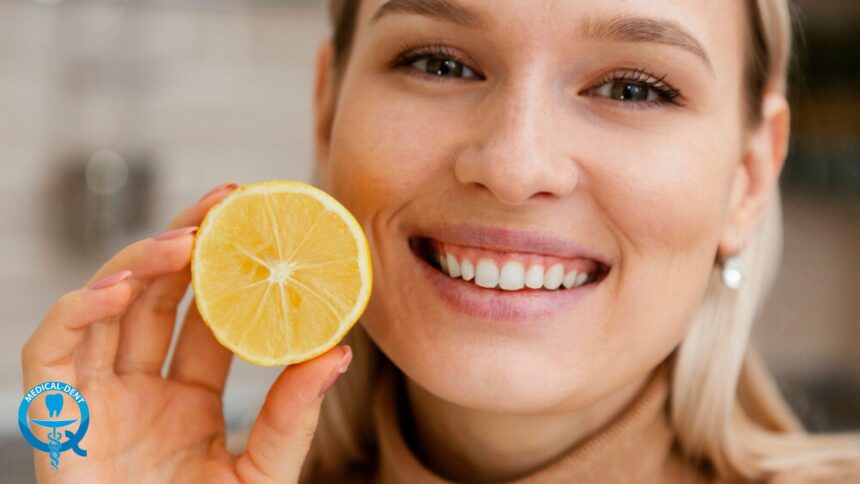Do you dream of a white smile but don't want to reach for chemical whitening agents? Many people try natural ways to whiten their teeth, such as baking soda, coconut oil or activated charcoal. But do they really work and are they safe? Find out what you need to know about home whitening and which methods are most effective.
What does tooth colour depend on?
The colour of our teeth depends on many factors, including genetics, diet, oral hygiene and the ageing process. Importantly, some people have inherently lighter enamel, while others may have more yellowish or greyish enamel.
You can read more about this in our article "What tooth colour depends on".
In addition, consumption of coffee, tea, red wine, and cigarette smoking contribute to the formation of discolouration.
Regular oral hygiene helps to keep teeth healthy, but it is not always enough to get them a snow-white shade. That's why many people look for effective whitening methods, including home ones.

Natural ways to whiten teeth
Some of the most popular natural ways to whiten teeth include.
- Baking soda - can be used as an additive to toothpaste or on its own. Thanks to its abrasive properties, it removes superficial stains, but its frequent use can damage enamel.
- Activated charcoal - acts in a similar way to baking soda, absorbing stains and plaque from the surface of the teeth. Unfortunately - similarly - excessive use can lead to weakened enamel.
- Vegetable oils (e.g. coconut) - the 'oil pulling' method of rinsing the mouth with oil is said to help remove bacteria and improve the colour of teeth. However, there is insufficient scientific evidence for its effectiveness in whitening.
IMPORTANT: Some popular methods can do more harm than good. This is primarily rubbing your teeth with lemon or vinegar. The acids in lemon and vinegar dissolve the enamel, making teeth more susceptible to decay and sensitivity.

Another method that should not be used is a mixture of baking soda and hydrogen peroxide. It causes irritation to the gums and also abrades the enamel.
Finally, the popular rubbing of teeth with fruit, such as strawberries or bananas. Although these fruits contain natural enzymes that can temporarily brighten teeth, their acids can also weaken enamel, especially with frequent use.
IMPORTANT: Damage to the enamel causes tooth sensitivity and a greater risk of decay. Therefore, before deciding on any of the options, it is better to consult your dentist or opt for professional whitening under his "guidance".

Professional teeth whitening at the dentist's office
There are quite a few options for in-office teeth whitening.
The first and very popular is overlay whitening. You will then receive trays and a gel with the right concentration to suit your teeth. If you are interested in this topic, we recommend our text "Overlay teeth whitening at home".
Another option you have is lamp whitening. This is a fast and effective method that gives immediate results. And you can read more about it in the text "Teeth whitening with LED lights - what it involves and how much it costs".
Finally, the most effective method, the Enlighten system. In just three weeks you can achieve a B1 shade, the closest thing to white in dentistry, and the effect - as long as you follow a few rules - lasts a lifetime. Here we refer you to the article "The best way to whiten teeth - the Enlighten system!".

And how much does it all cost?
Clearly, natural ways to whiten teeth will be cheaper than professional ones. However, the effect will not last as long, and their improper use may end up requiring dental treatment.
When it comes to prices for professional whitening then at our practice you will pay £250 for overlay whitening, £350 for LED lamp whitening and the Enlighten system is an expense of £550.
IMPORTANT: If you choose to have your teeth whitened at our practice and the amount is more than £350 you can take advantage of the instalment scheme. It is 100% secure and regulated by the Financial Conduct Authority (FCA number: 619628). Importantly, the first 12 months are zero interest.
If you want to learn more we recommend our text "Instalment scheme for dental treatment in the UK" or you are welcome to contact.

